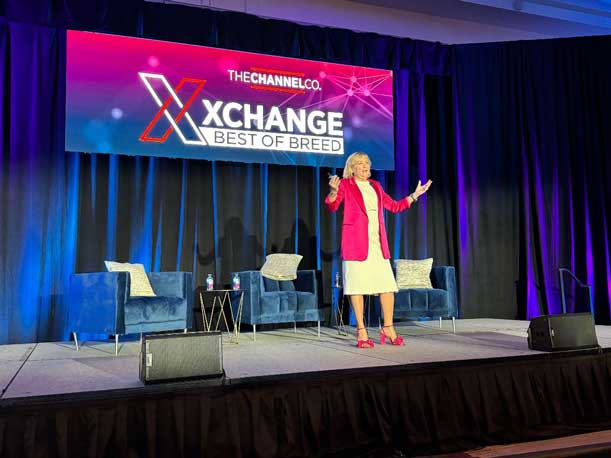Insight CEO Mullen: The Channel Needs To Be On Its ‘Front Foot’ To Put AI To Good Use
‘The question is, how do you monetize [AI] as you go along? But the most important thing for me is how do you deliver on ROI so a customer can invest in the next step?’ Insight Enterprises President and CEO Joyce Mullen tells an audience of solution providers at the XChange Best of Breed Conference.

Insight Enterprises President and CEO Joyce Mullen has seen employees and interns find ways to leverage new artificial intelligence technology to improve the business.
The Chandler, Ariz.-based company—No. 16 on CRN’s 2023 Solution Provider 500—has about 3,000 users a day using Insight’s own InsightGPT corporate generative AI architecture to summarize meeting notes and rewrite cover letters, Mullen told a crowd of solution providers at CRN parent The Channel Company’s 2023 XChange Best of Breed Conference.
But some of the more complex uses of AI from employees include three interns who built a sales aid program that creates summaries of client priorities based on regulatory filings and recent articles, matching those priorities with available Insight products and services to create a starting point for a sales call, Mullen said.
[RELATED: Microsoft Star Insight Enterprises Has $1.5B In M&A ‘Fuel’]
Insight CEO Joyce Mullen On AI
In another example, a warehouse worker in Chicago automated some manual processes in the SAP ERP tool he uses.
“He says it took him 10 hours of work on a monthly basis down to 45 minutes,” Mullen said. “I love stories like that. That is a citizen developer. I mean, that is fantastic work. And we are celebrating that.”
Tanaz Choudhury, CEO of Houston-based TanChes Global Management—a member of CRN’s 2023 Managed Service Provider 500—told CRN that Mullen saying “clients buy outcomes” over pieces of technology spoke to her.
Clients’ need for guidance in assessing new technologies such as AI and figuring out if and where it belongs will make TanChes and other solution providers even more critical, she said.
“We can genuinely take that and then add perspective depending on what you’re selling or whom you’re speaking with,” Choudhury said. “AI is like the internet. It’s here to stay. Whether you like it or you hate it, you either jump on the bandwagon now or you will be in the last caboose.
“You have to know where you are infusing it, which I think is going to be the hardest metric for anybody right now just because it’s so unique and it’s new.”
Mullen takes the opportunity of AI so seriously that she has cautioned employees that “AI is not going to replace you. … But you could be replaced by somebody who knows how to use AI better than you.” She promises employees who figure out how to automate “a bunch of that soul-sucking work” another job at Insight.
For the channel, AI represents more “job security” because clients will need solution providers to guide them through the transformation.
For now, Insight is not seeing a high volume of sales from GenAI, according to Mullen.
“I think it’s coming. It better be coming,” she said. “So I think this is going to be good for us. And so the question is, how do you monetize it as you go along? But the most important thing for me is how do you deliver on ROI so a customer can invest in the next step?”
The early GenAI-related customer engagements have centered around data estate assessments, similar to what other solution providers interested in AI have experienced.
But Insight has invested heavily in internal R&D, Mullen said, with more than 100 patents pending for the self-described “solutions integrator.” Insight also continues to iterate on its SnapStart proprietary network discovery tool and Lens metadata-driven data ingestion architectures.
Insight also recently launched a global multi-cloud visibility, spend-optimization offering based on Hanu, a Microsoft Azure MSP the company bought last year, she said.
Issues around bias, security and GenAI used by threat actors still need to be addressed. But Mullen said she’s “a technology optimist” overall.
“At the end of the day, I think we have got to be on our front foot to figure out how to adopt these technologies and put them to good use because certainly our customers need it,” she said.